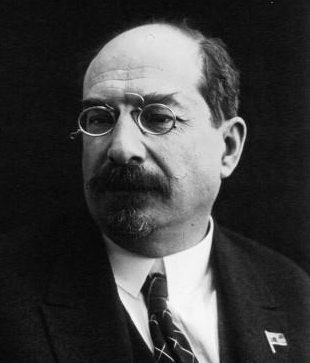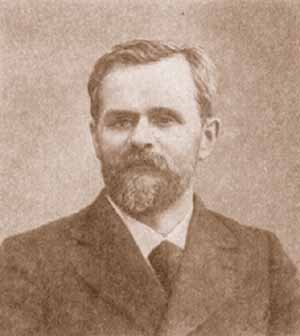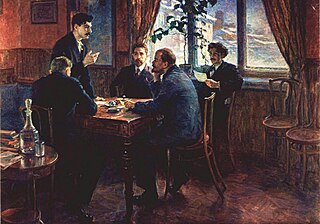Related Research Articles

Alexander Fyodorovich Kerensky was a Russian lawyer and revolutionary who led the Russian Provisional Government and the short-lived Russian Republic for three months from late July to early November 1917 (N.S.).

The Bolsheviks, led by Vladimir Lenin, were a far-left faction of the Marxist Russian Social Democratic Labour Party (RSDLP) which split with the Mensheviks at the Second Party Congress in 1903. The Bolshevik party, formally established in 1912, seized power in Russia in the October Revolution of 1917, and was later renamed the Russian Communist Party, All-Union Communist Party, and Communist Party of the Soviet Union. The party's ideology, based on Leninist and later Marxist–Leninist principles, is known as Bolshevism.

Lev Davidovich Bronstein, better known as Leon Trotsky, was a Soviet politician, revolutionary, and political theorist. He was a central figure in the 1905 Revolution, October Revolution of 1917, Russian Civil War, and establishment of the Soviet Union. In the early years of Soviet Russia, Trotsky and Vladimir Lenin were widely considered its two most prominent figures, and Trotsky was Lenin's de facto second-in-command in the government from 1917 to 1923. Ideologically a Marxist and a Leninist, Trotsky's thought inspired a school of Marxism known as Trotskyism.

Leninism is a political ideology developed by Russian Marxist revolutionary Vladimir Lenin that proposes the establishment of the dictatorship of the proletariat led by a revolutionary vanguard party as the political prelude to the establishment of communism. Lenin's ideological contributions to the Marxist ideology relate to his theories on the party, imperialism, the state, and revolution. The function of the Leninist vanguard party is to provide the working classes with the political consciousness and revolutionary leadership necessary to depose capitalism.

Marxism–Leninism is a communist ideology that became the largest faction of the communist movement in the world in the years following the October Revolution. It was the predominant ideology of most communist governments throughout the 20th century. It was developed in Russia by Joseph Stalin and drew on elements of Bolshevism, Leninism, Marxism, and the works of Karl Kautsky. It was the state ideology of the Soviet Union, Soviet satellite states in the Eastern Bloc, and various countries in the Non-Aligned Movement and Third World during the Cold War, as well as the Communist International after Bolshevization.

The Russian Revolution was a period of political and social change in Russia, starting in 1917. This period saw Russia abolish its monarchy and adopt a socialist form of government following two successive revolutions and a civil war. It can also be seen as the precursor for the other revolutions that occurred in the aftermath of World War I, such as the German Revolution of 1918–1919. The Russian Revolution was one of the key events of the 20th century.

Trotskyism is the political ideology and branch of Marxism developed by Russian revolutionary and intellectual Leon Trotsky along with some other members of the Left Opposition and the Fourth International. Trotsky described himself as an orthodox Marxist, a revolutionary Marxist, and a Bolshevik–Leninist as well as a follower of Karl Marx, Frederick Engels, Vladimir Lenin, Karl Liebknecht, and Rosa Luxemburg. His relations with Lenin have been a source of intense historical debate. However, on balance, scholarly opinion among a range of prominent historians and political scientists such as E.H. Carr, Isaac Deutscher, Moshe Lewin, Ronald Suny, Richard B. Day and W. Bruce Lincoln was that Lenin’s desired “heir” would have been a collective responsibility in which Trotsky was placed in "an important role and within which Stalin would be dramatically demoted ".

Anatoly Vasilyevich Lunacharsky was a Russian Marxist revolutionary and the first Bolshevik Soviet People's Commissar (Narkompros) responsible for the Ministry of Education as well as an active playwright, critic, essayist, and journalist throughout his career.

Marxism is a political philosophy and method of socioeconomic analysis. It uses a dialectical and materialist interpretation of historical development, better known as historical materialism, to analyse class relations, social conflict, and social transformation. Marxism originates with the works of 19th-century German philosophers Karl Marx and Friedrich Engels. Marxism has developed over time into various branches and schools of thought, and as a result, there is no single, definitive "Marxist theory". Marxism has had a profound effect in shaping the modern world, with various left-wing and far-left political movements taking inspiration from it in varying local contexts.

Vasilii Pavlovich Vorontsov was an influential Russian narodnik economist and sociologist, one of the principal protagonists in the controversy between narodnik and Marxist economists in the 1880s and 1890s.

Georgi Valentinovich Plekhanov was a Russian revolutionary, philosopher and Marxist theorist. Known as the "father of Russian Marxism", Plekhanov was a highly influential figure among Russian radicals, including Vladimir Lenin.

Left communism, or the communist left, is a position held by the left wing of communism, which criticises the political ideas and practices espoused by Marxist–Leninists and social democrats. Left communists assert positions which they regard as more authentically Marxist than the views of Marxism–Leninism espoused by the Communist International after its Bolshevization by Joseph Stalin and during its second congress.

Yuliy Osipovich Tsederbaum, better known as Julius Martov, was a Russian revolutionary, politician, and the leader of the Mensheviks, a faction of the Russian Social Democratic Labour Party (RSDLP). A close associate of Vladimir Lenin prior to 1903, Martov broke with him following the RSDLP's ideological schism, after which Lenin led the opposing faction, the Bolsheviks.
The Mezhraiontsy (Russian: межрайонцы, IPA:[mʲɪʐrɐˈjɵnt͡sɨ]), usually translated as the "Interdistrictites," were members of a small independent faction of the Russian Social Democratic Labor Party (RSDLP), which existed between 1913 and 1917. Although the organization's formal name was the Russian Social Democratic Labor Party (Internationalists), the names "Mezhraionka" for the organization and "Mezhraiontsy" for its participants were commonly used to indicate the group's intermediate ideological position between the rival Menshevik and Bolshevik wings of the divided RSDLP.

The League of Struggle for the Emancipation of the Working Class (LSEWC) was a Marxist group in the Russian Empire. It was founded in St. Petersburg by Vladimir Lenin, Julius Martov, Gleb Krzhizhanovsky, Anatoly Vaneyev, Alexander Malchenko, P. Zaporozhets and V. Starkov in the autumn of 1895. It united twenty different Marxist study circles, but Lenin dominated the league through the 'central group'. Its main activity was agitation amongst the workers of St Petersburg and the distribution of socialist leaflets to the factories there.
A socialist state, socialist republic, or socialist country, sometimes referred to as a workers' state or workers' republic, is a sovereign state constitutionally dedicated to the establishment of socialism. The term communist state is often used synonymously in the West, specifically when referring to one-party socialist states governed by Marxist–Leninist communist parties, despite these countries being officially socialist states in the process of building socialism and progressing toward a communist society. These countries never describe themselves as communist nor as having implemented a communist society. Additionally, a number of countries that are multi-party capitalist states make references to socialism in their constitutions, in most cases alluding to the building of a socialist society, naming socialism, claiming to be a socialist state, or including the term people's republic or socialist republic in their country's full name, although this does not necessarily reflect the structure and development paths of these countries' political and economic systems. Currently, these countries include Algeria, Bangladesh, Guyana, India, Nepal, Nicaragua, Sri Lanka and Tanzania.
A proletarian revolution or proletariat revolution is a social revolution in which the working class attempts to overthrow the bourgeoisie and change the previous political system. Proletarian revolutions are generally advocated by socialists, communists and anarchists.

Zinovii Isaevich Grzhebin was a Russian publisher and caricature illustrator. He represented more than 20% of the publishing market in Russia in the early 1910s and made a significant impact on development of the Russian book publishing industry.

Isaak Khristoforovich Lalayants was a Russian revolutionary, Bolshevik and comrade-in-arms of Vladimir Lenin.

The first conference of the Russian Social Democratic Labour Party (RSDLP) took place in Tampere (Tammerfors), Grand Duchy of Finland, in December 1905. Held between the 1905 London and 1906 Stockholm party congresses at the Tampere Workers' Hall, the conference was an unofficial meeting of the Bolshevik faction of the party. It is particularly remembered for playing host to the first meeting of Vladimir Lenin and Joseph Stalin. The conference resolved to forgo participation in the new State Duma, as did most of the far left parties. They later reversed this decision in 1907.